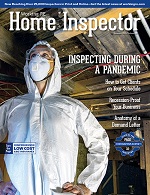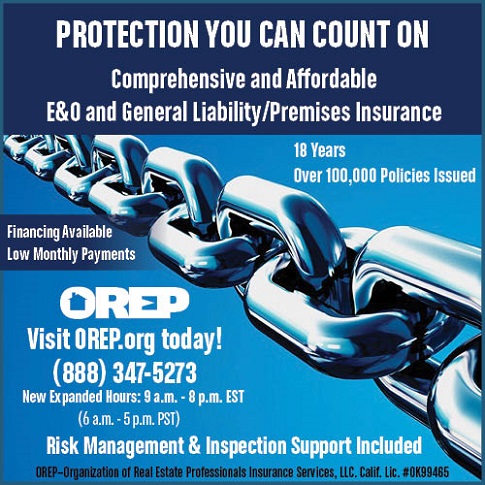 |
> E&O/GL Insurance for Home Inspectors Competitive Rates, Broad Coverage, Free Risk Management, online inspection support for tough questions, discounts on education and more... Professional Coverage, Competitive Pricing Shop OREP today! |
>> Editor’s Note: To help you stay up-to-date and connected, OREP/Working RE has established a Coronavirus (COVID-19) Discussion and Resource Page where you can share your thoughts, experiences, advice and challenges with fellow inspectors. See what Inspectors are saying here!
>> Take the Coronavirus: National Home Inspector’s Survey. Provide your industry feedback.
How to Recession-Proof Your
Home Inspection Business
by Ian Robertson, Inspector Toolbelt
With COVID-19 shutting down most of the country recently, and talk of an unprecedented 25% unemployment rate— a recession has become more real for us. News articles make it seem like the end of the world. But while a recession is a big and serious event, it is also what is considered a normal (even necessary) part of the market cycle. Don’t get me wrong, no one looks forward to a recession this big, but I have survived in the inspection industry through “The Great Recession” and learned a lot about how to recession-proof a home inspection business. In fact, a recession can even help you grow your inspection business and thrive (as strange as that might sound). Here are some tips how.
Understanding What a Recession Means
for Your Inspection Business
When we hear the word “recession,” we tend to cringe a bit. But a recession is not necessarily a bad thing for the home inspection industry—if you play your cards right. Instead of viewing a recession as a problem—view it as an opportunity. For instance, I carried one of the home inspection companies that I own through the Great Recession, and started a second home inspection company toward the end of it. How is that possible? Well, it came down to numbers.
In my market area, there were about 400 licensed inspectors before the last recession (the state of New York posts this information on their website). After the recession though, there were about 185. That is a huge drop! Over half of the home inspectors in my area gave up and hung up their license. So advantage #1: less competition.
But for me, there were other benefits. First, folks were cautious for years after that about starting a business, so there were very few new inspectors for quite some time. Advantage #2: no new competition for many years after the recession.
On top of that, when the market goes down, it tends to become a “buyer’s market,” which is good if you are a thorough and skilled inspector. For instance, during a seller’s market, there may be five buyers for every house. During a seller’s market, buyers may waive their inspections, hire the cheapest or fastest or get whoever is available first so they can move on things. But things move slower in a buyer’s market. There may be five houses for every buyer, so the buyers tend to be choosier about their inspectors. Buyers and agents who didn’t like how thorough I was before the recession were now calling me to get me on the books because I am thorough. So that is advantage #3: everyone loves a thorough home inspector in a buyer’s market.
So don’t view a recession as a problem to overcome necessarily but as an opportunity to grow, improve your business, and increase your worth. But let’s talk strategy now. Besides the information above, how can you “recession-proof” your home inspection business?
Recession-Proof Your Home Inspection Company
Below are some of the most important lessons I learned about recession-proofing a home inspection company. I am going to be frank about it—a recession requires more work. The market has had low-lying fruit from some time, so reaching to the higher branches takes effort and determination.
1: Market More—Not Less: One of the first things that a lot of home inspectors do when a recession starts is to turn off their marketing or pull back on it. They do this to save money during tight times, but that is counterintuitive. You should INCREASE your marketing, not decrease it. I will give you two good examples of this.
During the last recession everyone turned off their Adwords, but I turned mine up and spent more money on it. So now I had almost no competition for Adwords and I had a great budget—so guess who got all the online work? Also, I never stopped doing office presentations, lunch and learn sessions, and more. Agents appreciated that I still came around because other inspectors didn’t want to stop by or buy lunch anymore. I built relationships there that are still around today.
(story continues below)
(story continues)
Those are just two examples out of many. The point is, increase advertising, don’t decrease it. You won’t see as much return on investment as you did before the recession a lot of the time, but the seeds of success take time to grow, and it will keep you thriving through a recession.
2: Expand Your Services: This one comes down to numbers. If there are 100 people needing a home inspector in your market, but 20 of them need a septic inspection, five a well test and 10 a pest inspection, you will capture more of that business if you offer the additional services they need.
Work at expanding your services now. We all have reasons for not adding services—added liability, we don’t want to dig holes and smell the septic tank, the pool training course is too long or whatever it happens to be. But adding services allows you to capture more leads, whether or not there is a recession. Whatever services you add on, be sure to be qualified and well trained before offering those services to clients.
3: Do More Seller Inspections: When the market is slow, sellers will do anything to make their homes seem more appealing to a buyer. Pre-listing inspections are a great way to do this. The best part is that every seller is an opportunity to do a buyer-side inspection for them as well. So get out there and market pre-listing inspections.
4: Work More than You Want To: I hate saying this because I am of the mind that you should control your business and not work yourself to death—as that negates all the benefits of owning your own business. But if you do eight inspections a week now, and the market drops by half, you will be left with four inspections a week hypothetically. So sit down and figure out how many inspections you need to do per week and then increase that by whatever is doable.
Obviously, those are just rough numbers, but the point is if you are doing the bare minimum of inspections now, you will likely be under the bare minimum during a recession. So work a little bit more than you want to now, so you can keep afloat later on.
5: Have a Side Gig Ready: This one is simple; get a side gig. Have a contractor buddy? Talk to him about doing some side work. Have a particular skill? Get it ready to deploy. I say this because as we mentioned before, over 200 inspectors dropped out of my market area. But why give up a good business because it got slow? Instead, supplement that business until things pick up. Below are some side gigs that a lot of inspectors I know are doing now in preparation:
• Radon mitigation
• Pest control
• Handyman work
• Field inspections
• Cleaning services
You don’t have to pick from that list, but do you see a common theme? Low startup costs, low overhead (for the most part) and something that won’t interfere with scheduling home inspections. You don’t want to take a side gig that will make you have to turn down inspections when they come in. (OREP offers E&O for many of these services. Please ask your OREP agent.)
6: Don’t Panic When Things Get Slow: So many people panic. Panicking doesn’t change the situation; it just changes how you address it. An inspector I know panicked once when things got slow for a few months, so he found a new job, shut everything down and told everyone he was out of business. But when things picked up, he regretted it.
Recessions happen, so don’t panic. If you can hold it together, you will likely be able to make it through fine.
7: Be the Best: We talked about this above but it’s worth mentioning again. When a recession happens, it typically becomes a “buyer’s market.” With more houses than buyers, buyers become more cautious, take their time, and research inspectors more before they hire them. If you are highly skilled and qualified, you will be their top pick. Low-ballers and fast inspectors don’t do as well in a buyer’s market.
8: Don’t Give Up: Those who stick around are the ones who come out on top. Don’t get discouraged; adapt instead. If I did it, you can too. If you do make it through, your company will be better and busier than ever. So don’t give up.
Conclusion
Recessions come and go every so many years. But a recession does not mean that things are impossible to work through. View a recession a lot like a storm, and your business like a house that you built. If you get your home ready for the storm, it will likely make it through. Will there be some damage? Sure. But if your house is one of the last ones standing, guess who has some valuable real estate at that point. So come what may, work now to recession-proof your home inspection company.
About the Author
Ian Robertson is a veteran home inspector, owner of three inspection companies, owner of Full View Home Inspector Marketing, and one of the founders of Inspector Toolbelt. Inspector Toolbelt is simple administrative and scheduling software for home inspectors that makes running your inspection business easy and automated.
OREP/WRE Coronavirus Discussion and Resource Page
Coronavirus: National Home Inspector Survey
Free Risk Management Online Course Claims and Complaints: How to Stay Out of Trouble
Available Now
Presenter: David Brauner, Senior Insurance Broker OREP
David Brauner, Senior Broker at OREP, shares insights and advice gained over 25+ years of providing E&O insurance for inspectors, showing you how to protect yourself and your business.. Watch Now!
Note: The Summer2020 issue of Working RE Inspector is mailing now to over 25,000 home inspectors nationwide. OREP Insureds enjoy guaranteed delivery of each print magazine and many more benefits.


